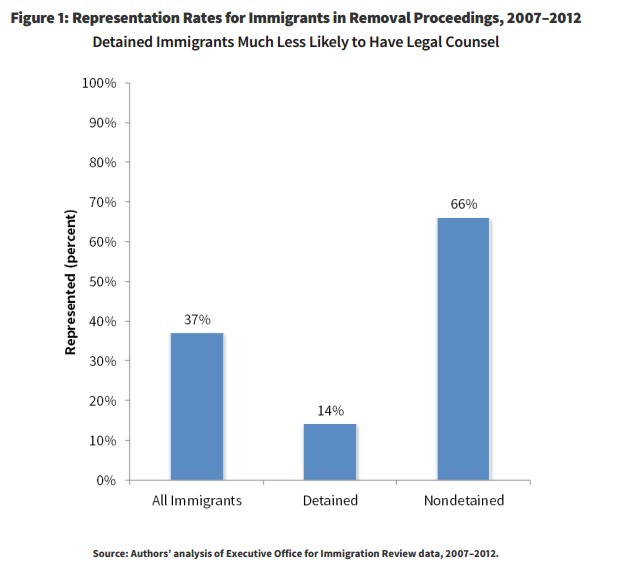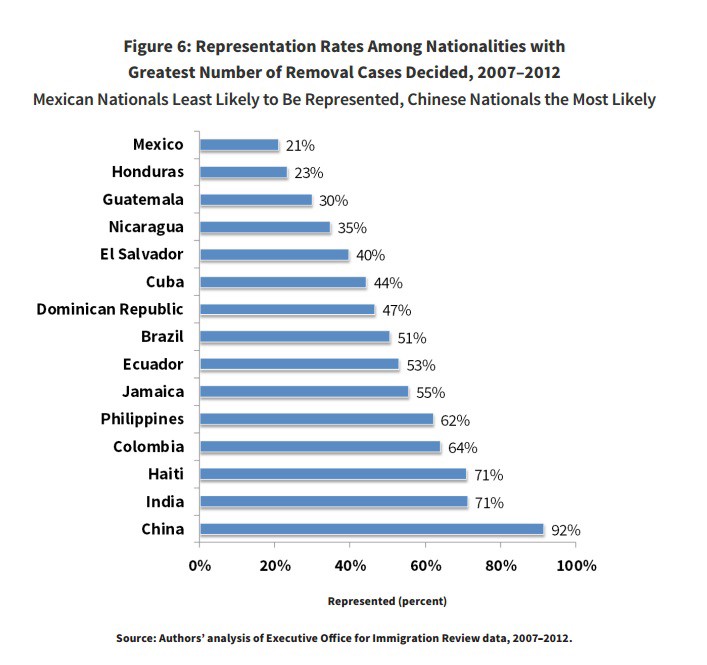Immigrants are allowed to have a lawyer when they’re pleading their cases in immigration court, but unlike U.S. citizens, they are not automatically provided legal representation. Some are able to obtain lawyers to fight for them to either get out of deportation proceedings or to apply for some sort of relief so that they can permanently stay in the country. Others who don’t have access to counsel are up against well-trained government lawyers whose jobs are to follow stringent laws.
That matters because immigrants with legal representation are more likely to be released from detention, more likely to apply for some form of relief, and more likely to receive the relief they sought, according to a national study of access to counsel in immigration courts by the American Immigration Council (AIC).
Yet, the vast majority of immigrants do not have legal representation in immigration court, leaving them more vulnerable to being removed from the United States.
The AIC report — which analyzed data from 1.2 million individual removal cases in immigration court between 2007 and 2012 — found widespread disparities in how legal representation affects the outcome of immigrant cases. Only 37 percent of all immigrants in the study were able to secure legal representation, with immigrants living in New York City and other big cities getting far more access to representation than those living in small cities. The data found that only 14 percent of detained immigrants, like those who were held in prisons, jails, and detention centers, were able to secure legal representation — about five times less than nondetained immigrants. Meanwhile, only 2 percent of people without lawyers were able to successfully avoid deportation.

Researchers Ingrid Eagly, Esq. and Steve Shafer, Esq also found that Mexican immigrants had the highest detention rate — 78 percent — and the lowest representation rate — 21 percent — of all the nationalities that they looked at. Chinese immigrants had the lowest detention rates — 4 percent — and highest representation rate — 92 percent. The researchers explained that it was possible the the difference in representation rates across nationalities could be due to some factors including economic status and the ability to find a lawyer which could “be influenced by the strength of the social networks that different immigrant groups have to assist them in finding counsel.”

Overall, legal representation gives immigrants a fairer shot inside the courtroom. Eagly pointed out the various steps that immigrants may not know about when they want to be released from detention, like seeking a custody redetermination hearing to present evidence and get a bail bond amount that they can afford.
“It’s very difficult to do this without an attorney present,” Eagly said on a press call with reporters on Wednesday. “But if you have to do this yourself, you have to know that you can request a custody redetermination hearing.”
Although the data comes from a five year period ending in 2012, immigrants are still encountering the same lack of representation.
Jojo Annobil, Executive Director of the Immigrant Justice Corps, an organization that provides legal representation for immigrants, pointed to the overwhelming lack of legal representation for unaccompanied children from Central America who began showing up on the southern U.S. border in late 2013. At the time, the government put the children on a “rocket docket,” shuttling their cases into the immigration courtroom as quickly as possible which left many lawyers scrambling to defend them. In New York City where his organization is based, Annobil said that funding for legal representation for children has helped them to stay in the country.
“It went to show that even though the government wants to process [the children] quickly, when counsel got involved, they were able to apply for relief from removal,” Annobil said on the same press call.
“In a lot of these cases, just having a lawyer makes the system fairer for these folks,” Annobil added.
